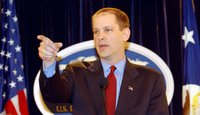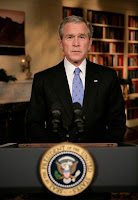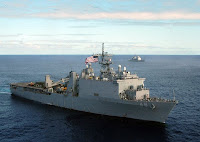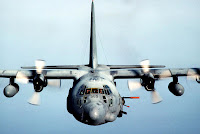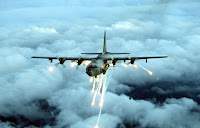Daily Press Briefing, Spokesman Sean McCormack, FULL STREAMING VIDEO, file is windows media format, running time is 28:47.
Immediately prior to returning to the State Department, Mr. McCormack served as Special Assistant to the President, Spokesman for the National Security Council, and Deputy White House Press Secretary for Foreign Policy. State Department Photo by Michael Gross. TRANSCRIPT:, 12:45 p.m. EST.
MR. MCCORMACK: Good afternoon, everybody.
QUESTION: Good afternoon.
MR. MCCORMACK: Good afternoon to you, Lambros. How are you?
QUESTION: Very well. Happy New Year.
MR. MCCORMACK: Good. Happy new year to you. I don't have any opening statements, so we can get right into your questions.
QUESTION: We'll let Lambros ask his question and get it out of the way.
MR. MCCORMACK: All right, Lambros. (Laughter.)
QUESTION: May I?
MR. MCCORMACK: You're a leadoff hitter.
QUESTION: Oh, there is a new era in here. (Laughter.)
MR. MCCORMACK: You have the floor. You have the floor, Lambros.
QUESTION: Okay. Mr. McCormack, yesterday Under Secretary Nicholas Burns during a visit at the Greek Embassy with the presence of Greek Ambassador Mallias, in answer to a question of Cyprus stated inter alia, "We think, we hope that 2007 could be a year of Cyprus. And UN Secretary General Ban Ki-moon is now putting together a team. We hope that there will be even senior Americans on that team in the new UN effort to try to resolve finally the problems that have stemmed from the invasion of Cyprus 30 years ago." A similar statement was made by Deputy Assistant Secretary Matt Bryza before yesterday, in answer to a question of mine with the presence of the Turkish Ambassador, Mr. Sensoy, during a conference at Sofitel Hotel here in Washington. I'm wondering based on what you are so optimistic, so clear that 2007 will be the Cyprus year for a final solution.
MR. MCCORMACK: Well, we hope that all the relevant parties can come together to once again try to find a solution to this very difficult long-standing problem. Secretary General Annan made tremendous efforts to propose a solution that was put to the test of the voters and ultimately the Greek Cypriots decided against it. They voted against it. And so I think that in the wake of that there wasn't much interest among the members of the international community for reenergizing efforts to try to come to a solution. But I think we have gotten to a point now where enough interested parties in the region have expressed an interest in maybe trying again to find a solution; that the UN has taken another look at this issue and they may consider what it is that they might do. We support them in those efforts. And should they decide to move forward with a new effort to try to find a solution, we would certainly support them in those efforts, but we would be in a supporting role.
Yeah, Sylvie.
QUESTION: Can you confirm a new U.S. raid in south of Somalia today?
MR. MCCORMACK: I can't, no. There are -- let me -- in terms of any questions about ongoing operations, you can talk to the Department of Defense about that. We do as a U.S. Government have an ongoing interest in seeing that those who are involved in terrorism, members of terrorist organizations, those who are known to have perpetrated acts of terrorism against the United States, U.S. interests or its friends and allies. We want to make sure that those individuals are not able to flee Somalia, where they previously had enjoyed safe haven or at least, at the very least, the protection of some individuals in Somalia.
So as a U.S. Government, do we have an interest in seeing that they aren't allowed to leave Somalia and that, if possible, they are brought to justice? Absolutely. But I'm not going to comment on any particular effort in that regard. You all know that we do have military assets in the area. It's been publicly acknowledged that we do have naval assets off the coast of Somalia in that Horn of Africa region. We do have an active anti-terrorism effort in the Horn of Africa based out of Djibouti, and that's a cooperative effort with neighbors in the region. But it's not my role to really talk about any sort of ongoing or planned operations that we may have.
Sue.
QUESTION: Could you comment on criticism from the European Union, Italy and others about the U.S. military action in Somalia? They say that all this will do is stoke up hostilities in the region and cause further problems.
MR. MCCORMACK: Well, you know, of course we're sympathetic to the idea that you don't want to -- in your counterterrorism efforts you don't want to create more problems for yourself. But also senior policymakers, senior officials involved in our counterterrorism efforts are paid to make difficult judgments about those sorts of tradeoffs. When do you have actionable intelligence? When do you have an opportunity to either prevent a terrorist act or to go after those who either are planning them or have perpetrated them? And those are -- there's not a cookie-cutter answer to that. They do it on a case-by-case basis.
And all of these various considerations go into deciding how to approach a given situation and there may be criticism of that, but of course that comes with the territory. And we would hope that after -- inasmuch as we can provide information and facts to our friends and allies about what it is that we have or plan to do, then we'll do so. There are obviously constraints on that. And if they are not supportive of those efforts, well then that's sometimes just the way it works out. But of course we -- of course we're sensitive to the idea that in protecting the United States and its interests we also have to do the cost-benefit analysis. But at the end of the day, we're going to err on the side of protecting the American people and protecting American interests.
QUESTION: And there are also conflicting reports on the ground as to the death toll. Are you going to at some point be able to release a U.S. estimate as to how many died? The Somalis say it's many -- could be up to 50.
MR. MCCORMACK: Right. If there's any information to be provided in that regard, if it's appropriate to come from the State Department, then I'll be happy to talk about it. But if others -- if it's more appropriate for others to talk about it, then others will talk about it, but I don't have any additional information that I can offer you.
Nicholas.
QUESTION: Sean, I think part of the criticism that she was talking about has arisen out of the fact that your allies say they didn't know about what was going to happen militarily in Somalia. Yesterday you said that you hadn't spoken to the Secretary to see whether she knew about it in advance, but are you aware of any contacts with European allies to --who are involved in Somalia to inform them that such a strike was --
MR. MCCORMACK: I don't know. You can talk to DOD about that.
QUESTION: But you are in charge of diplomacy with --
MR. MCCORMACK: Well, I know but they are also mil-to-mil relationships as well and those would be actually the appropriate channels more likely than not, that those communications would go through. I can't tell you whether or not there was any discussion beforehand. Very frequently in counterterrorism operations you have to maintain a certain amount of operational security around them. That doesn't mean that there's a lack of trust there, but those are the hard facts of conducting counterterrorist operations.
Yeah, Kirit.
QUESTION: Can I change the subject?
MR. MCCORMACK: Anything else on Somalia?
QUESTION: Iraq?
MR. MCCORMACK: Sure.
QUESTION: Senior Administration official just said that there's a plan to double the number of PRTs in Iraq. I'm wondering if you have any information about that.
MR. MCCORMACK: I would recommend that you stay tuned to the President's remarks tonight. If there's anything more to say about expanding the number of Provincial Reconstruction Teams that we have on the ground in Iraq, then we'll be happy to provide you more details on it. Currently there are -- I think the last count is seven U.S. PRTs and three coalition PRTs, meaning they were staffed by other members of the multinational force, so there's a total of ten right now.
QUESTION: Do you have any -- I mean, could you give us an assessment of their progress so far?
MR. MCCORMACK: We think it's a very important part of certainly the State Department's efforts in Iraq to really get out to work with provincial and local leaders to -- on a whole variety of different issues, whether that's talking with them about building up the governing institutions in the outlining areas outside of Baghdad, working with them on local projects, working with them on, you know, individual entrepreneurs, with microfinance. That's another very interesting program that is ongoing has really shown results. And it's the kind of program that has demonstrated positive returns all around the globe. As a matter of fact, the latest Nobel Peace Prize Laureate is actually the person who started the programs in Bangladesh several decades ago.
So the PRTs are a very important element not only in getting out beyond Baghdad and working at the state and at the provisional and local level, but they are also important for the fact that they are the nexus in the field outside of Baghdad, outside of the headquarters elements, of the State Department and Department of Defense, that civil-military cooperation that is very, very important anytime you're dealing with counterinsurgency operations; that once you are able to confront the bad guys, whoever they may be, that you are able to flow in behind that with civil-military reconstruction efforts, efforts to work with local leaders to promote projects that are of interest to the local population, whether that's cleaning up the streets or painting schools or building schools or those kind of projects.
So that's a big chunk of what the PRTs -- these are the people that are really on the ground out there in the provinces, in the cities and the small localities working with Iraqis at the grassroots to help them build up those democratic institutions outside of the capital.
Sue.
QUESTION: I think the U.S. Government has disbursed over $16 billion so far in reconstruction assistance. I think it's about 16 billion of the -- I know we've got 22 billion in total but --
MR. MCCORMACK: It's about 80 percent has been -- 80 percent, I think, of the 20 billion --
QUESTION: Mm-hmm, or 22 billion.
MR. MCCORMACK: -- has been spent and I think the other -- the remaining 20 percent has been obligated. Roughly.
QUESTION: Right. Now, the President is suggesting another billion or so which will go into reconstruction and jobs. Why do you think that this extra billion or so will make any difference at all in turning the situation around?
MR. MCCORMACK: Well, first of all, as for any --
QUESTION: Or do you think additional reconstruction funds --
MR. MCCORMACK: First of all, as for the details of the President's speech and the strategy that he's going to outline, I suggest you wait until 9:01:30 tonight. You can tune in and you can hear it. But again, as I pointed out with Kirit, it is very important in counterinsurgency operations, and you can look at -- talk to all the experts, look at all the manuals, it's very important that once you have a cessation of the military operations in an area, in a small area, that you're able to flow in with the civil-military teams behind them, work with the local leaders, work on the local small-scale construction projects that have a real effect on people's daily lives. It is very important to help the Iraqis both rebuild their large-scale infrastructure -- we're talking power plants and power lines and oil, the oil pipelines and roads and sewage treatment and water plants, all of those things -- because they were really neglected under Saddam Hussein. It was really a decrepit infrastructure, and particularly outside of Baghdad. So that was important money to have spent.
We made a transition, I don't know, about a year or so ago, about a year, year and a half ago, to focus more on the smaller-scale projects because we understood that these are the projects that will have an immediate effect on people's lives. You know, building the power plant it may take some time and eventually they may get more hours of electricity, but they don't see any immediate benefit to that. And what we have learned and what we know is that there needs to be an immediate -- a more immediate demonstration of the benefits of working with the central government, working with the coalition forces as you're fighting insurgents, terrorists or sectarian militias, demonstrate to them that there are positive benefits that will flow from investing in that political process.
And you can do that over the short term, which is what we're talking about with the PRTs, but there also has to be some long-term expenditures to help with the large-scale infrastructure. And there are still a lot of needs in that regard and the Iraqis, I think, are going to be stepping up to that as well as perhaps others in the international community.
Yeah, Kirit.
QUESTION: The Secretary and President Bush met with or at least via videoconference a few of the PRT leaders, I think three in Baghdad and then one here last month.
MR. MCCORMACK: Right, right.
QUESTION: Can you say whether this decision came out of that discussion or what they --
MR. MCCORMACK: No -- well, I'll let the President talk about his own decisions. First of all, the predicate to the question is that there is the expansion, so nice try. But I think it is safe to say, because the President has spoken in public about this, that he was -- how impressed he was by the effectiveness of the program but also by the people who were leading these teams. These were experienced people who have a lot of years in dealing with just these kinds of issues and they were able to give him a real view from what's going on on the ground outside of Baghdad.
And it's also a program that has the full support of Secretary Rice. She went to Mosul to announce the startup of this program and introduced the first PRT to the media and to the rest of the world and to the Iraqis. So it's a program that she is very keen on and thinks it is very effective. And I think that the President in being able to talk one-on-one with these individuals also came away impressed by the dedication and the skill and the effectiveness of not only the program but the people.
Yeah, Joel.
QUESTION: Sean, in the recent past we've seen where following the war in the Middle East between Hezbollah and Israel, following the destruction of the section in south Beirut Hezbollah raced into that area and handed out gobs of money to people to rebuild their particular homes and apartments. Now, obviously that may have been for political purposes. What's to say that right now the way the -- in Baghdad the way the population, and Sadr City and other locations within the city are thinking -- now, this is not just for Baghdad but I would assume also for country wide -- Fallujah, Najaf, elsewhere. What's to prevent the Maliki government who cannot contain some of this violence to suddenly see other groups, Sunnis and Shiites, funneling money in there for those political purposes to maybe derail the infrastructure plans?
MR. MCCORMACK: Well, you do have outside groups and countries meddling in Iraq's internal affairs in a negative way and we've talked about that. Iran and Syria are two prime examples of that. It is important that the central government, any central government, demonstrate to the people that they should invest in the political process and support the political process, support the democratic institutions that are part of that political process. But as in any democracy the government has to respond to the needs of the people and if those needs are not being met in some regard in these fledging democracies, they're going to look elsewhere.
So certainly there are a bunch of different components to this. There needs to be responsible effective government that provides for the needs of the people and you also need to work to make sure that those outside groups in countries that are trying to negatively effect the situation in the country aren't able to do so, either by getting them -- requesting that they stop or conducting -- engaging in actions that will make them less effective in their ability to negatively influence a situation in the country.
Sylvie.
QUESTION: Do you have any detail on the controversy in the UN over the Hariri probe? Apparently, Russia wants to identify ten countries which didn't comply or didn't participate in the inquiry and the U.S. doesn't want to identify these countries. Why?
MR. MCCORMACK: Well, you can talk to the Russians what their motivation is. But look, we -- you know, our position is that we defer to Mr. Brammertz as to whether or not he thinks it's useful to identify these countries. If he thinks it's useful, then we would support his decision to do so. If he decides that it is not in the interest of the investigation to make this information public, then we support his decision not to release those names.
The fundamental question here, and people shouldn't become distracted by it, is what does Mr. Brammertz think is most useful in allowing his investigation to move forward. We have and will continue to support him and the investigation in whatever ways we possibly can to see that those responsible for the murder of Prime Minister Hariri -- former Prime Minister Hariri -- are brought to justice.
QUESTION: But don't you think there is a risk this inquiry could be seen as partial because Syria has been criticized because they didn't comply enough to the inquiry and now we learn that ten countries didn't and nobody cares?
MR. MCCORMACK: Well, I'm not sure -- first of all, you also don't know all the details and you're taking one snapshot in time. So again, you know, it shouldn't be about finger-pointing at this time. The fact that Syria has been cited as not being fully cooperative in the past with the investigation was important because -- let's be frank -- the signs pointed to some Syrian involvement in some fashion. Those were some of the initial indications that came out of Mr. Brammertz's predecessor, Mr. Mehlis, in conducting the investigation.
So let's distinguish here between those who may or may not have played a role and their cooperation, played a role in the assassination of Prime Minister Hariri and their cooperation, and perhaps others who are not in any way thought to be complicit in the murder of former Prime Minister Hariri. So there are two different categories here, I think, and I think Syria quite clearly falls into a category of its own so I wouldn't try to lump them all together.
QUESTION: You don't think it could slow the probe in its --
MR. MCCORMACK: No, I think that at the end of the day when Mr. Brammertz has concluded his investigation that he will lay out for all the information that he has and people can look at the body of evidence that he has amassed and they can then look at the conduct of the tribunal that will be put in place to assess this evidence and then also hold to account those responsible for the murder of former Prime Minister Hariri. So there will be plenty of time to consider the evidence and people will be able to make their own judgments about it. But again, the most important thing here is the integrity of the investigation, and that means allowing Mr. Brammertz to do what he thinks is best in achieving the goals that he -- achieving the objective that he has been charged with by the Security Council.
Yeah.
QUESTION: The East Asia summit takes place this weekend in the Philippines. Is the United States unhappy about being excluded from this, and what do you hope the summit might produce in the way of support for the Doha WTO talks or various anti-terrorism measures?
MR. MCCORMACK: I don't think we have any particular consternation about being left out. There are plenty of regional groupings.
And as for the Doha round of trade talks, I don't know. I have to admit I'm not fully briefed up on what it is the East Asia summit might or might not produce, but we would hope that as a general concept that states take quite seriously the importance of trying to reach some accord in this round of talks. Free trade has greatly benefited nations around the world, and most especially those nations in East Asia who have seen their economies grow by leaps and bounds over the past several decades. That has been in large part because of free trade.
And it is very important that we continue our efforts as an international trading community to not only maintain that system of free trade but to expand it and to try to go after remaining impediments that exist to free trade. We are committed to that. We have made some important proposals. We have made some important concessions as part of this. Unfortunately, however, in a couple rounds of discussions that are part of the Doha -- overall Doha round. We have not succeeded as a free trading community in coming to full agreement, but we certainly have not -- we have not given up on efforts to try to come to a successful conclusion of the Doha round and we would call upon others, including those attending that East Asia summit, to do what they can to see that we succeed. It's important.
QUESTION: And on the anti-terrorism issue, which is another major theme of the conference?
MR. MCCORMACK: Again, I confess I don't know what it is that they're -- is exactly on their agenda, but clearly we hope that there is an attitude of working with -- among themselves as well as with us and other countries to fight terrorism around the world. It's certainly an appropriate topic given that this conference is being held in the Philippines, which has suffered from terrorism from the Abu Sayyaf group as well as others. And we all know about the other terrorist activities in Southeast Asia as well. So I think certainly given the location, geographic location, an appropriate topic for them to talk about.
QUESTION: We have a speech by the Secretary shortly. I don't know if there are others, but can we --
MR. MCCORMACK: Yeah, I mean -- what, you want to throw me over for the Secretary, Charlie? Gosh almight. Let's go to Gollust here.
QUESTION: Richard Boucher -- is he on the road this week?
MR. MCCORMACK: Is he where?
QUESTION: Is he on the road this week?
MR. MCCORMACK: Yeah, he is out of the building. I'm not sure exactly where. Beyond the borders of the United States.
QUESTION: We have reports that he was in Afghanistan and I just wonder, if he was, what he was up to.
MR. MCCORMACK: I don't know. We have to have a Boucher tracker. I don't know. He's on the road quite a bit. I can't tell you.
QUESTION: And just one more. Khaled Mashal, the militant leader of Hamas, has made seemingly some disarmingly conciliatory remarks about Israel today.
MR. MCCORMACK: You know, I've seen some snippets of those reports and I have to confess I haven't seen all the remarks and I have to -- I have to check with the experts who follow these things on a minute and daily basis for whether or not these are significant in any sort of positive way. I can't tell you if they are or not.
QUESTION: (Inaudible.)
MR. MCCORMACK: Well, you know, sometimes I'm tempted, George. (Laughter.)
Yeah.
QUESTION: Iraq Foreign Ministry yesterday said that he turned down a request by the government to delay the hanging of Saddam. I just wanted to know if you had any comment on that.
MR. MCCORMACK: You know, again, these are decisions for the Iraqis to make in terms of the timing. Our admonition has been to do this in a way that meets Iraqi laws and regulations.
QUESTION: Do you know if the Secretary has seen the cell phone video of Saddam's hanging at all?
MR. MCCORMACK: I don't know. It's been on TV pretty much non-stop for the past couple of weeks, so I'm sure that she probably caught some of it on the TV.
QUESTION: Do you think you can follow up on Iraq?
MR. MCCORMACK: Well (inaudible), yes, ma'am.
QUESTION: Latin America. Barbara Slovin recently in USA Today had an article --
MR. MCCORMACK: I think it's Slavin.
QUESTION: Slavin, is that correct? Yeah, I wasn't sure. Concern about leftist victories in Latin America has prompted President Bush to quietly grant a waiver that allows the U.S. to resume training militaries from eleven Latin American and Caribbean countries. The 2002 U.S. law bars countries from receiving military aid and training if they refuse to promote immunity from prosecution to U.S. service members who might get hauled before the International Criminal Court. The law allows presidential waivers. Do you know which countries have granted immunity so far?
MR. MCCORMACK: I don't. We'll try to get you an answer.
Lambros, last one. Make it short.
QUESTION: On Iraq, it's important. Mr. McCormack, it was reported by Nation magazine that Secretary of State Condoleezza Rice and former Secretary of Defense Donald Rumsfeld met with Saddam Hussein during their last visit in Iraq and they asked him --
MR. MCCORMACK: When?
QUESTION: -- for his cooperation to defuse the resistance, but the late Iraqi dictator refused. I'm wondering is that true.
MR. MCCORMACK: That is just --
QUESTION: It was the last issue of the Nation magazine.
MR. MCCORMACK: That's just crazy. I don't know where they made that -- who made that up.
QUESTION: Even they underlined this in capital letters.
MR. MCCORMACK: It doesn't make it right. It just means they underlined it.
(The briefing was concluded at 1:15 p.m.), DPB # 6, Released on January 10, 2007
Technorati Tags:
State Department and
Secretary of State or
Secretary Boucher and
LEBANON, or
Israel and
Hariri Investigation or
Condoleezza Rice, or
Cyprus and
Somalia,, or
President Bush, and
Provincial Reconstruction Teams, or
Execution of Saddam Hussein, and
Prime Minister Siniora, or
Secretary Rice, and
VIDEO, or
Khaled Mashal, and
Reconstruction Assistance to Iraq

 .
. podnova Podcast Channel and receive the weekly Presidential Radio Address in English and Spanish with select State Department Briefings. Featuring real audio and full text transcripts, More content Sources added often so stay tuned.
podnova Podcast Channel and receive the weekly Presidential Radio Address in English and Spanish with select State Department Briefings. Featuring real audio and full text transcripts, More content Sources added often so stay tuned.





